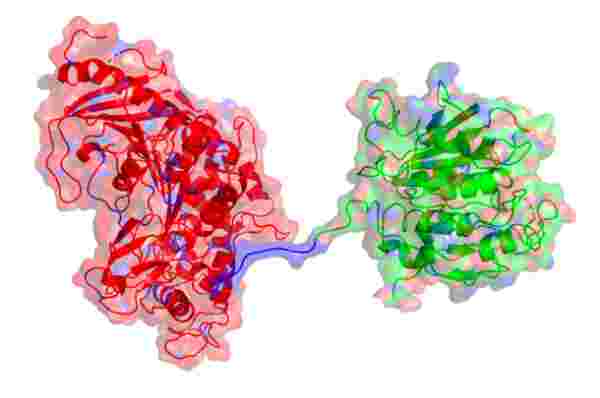Images of climate innovation
Hungry for plastic waste
This colourful image depicts a specially engineered enzyme that can digest plastic from a drinks bottle. We use plastic in almost every area of our lives - as packaging, in electronics, clothing and building materials. Plastic is inexpensive and easy to make. However, our planet is suffocating in plastic and its production, consumption and disposal is a significant driver of climate change. Scientists have created a plastic-eating enzyme, providing the potential to revolutionise the recycling process and help solve one of the planet’s biggest environmental issues.

Some plastics take more than 400 years to break down and half of all plastic becomes waste within a year of being made, yet most isn’t recycled. Plastic production, consumption and disposal is a significant driver of climate change, as plastic pollution reduces the resilience of communities and the natural world to cope with climate change and accelerates its impact.
Imagine a world where we can re-use this harmful plastic. At the University of Portsmouth, a team of scientists, led by Professor John McGeehan, have engineered an enzyme that can break down some of the world’s most commonly polluting plastics. The scientists are working on an enzyme called PETase, which can break down the PET (polyethylene terephthalate) found in single use plastic drinks bottles and textiles back into its original chemical components for re-use.
The story starts in 2016, following the discovery in a Japanese recycling dump of a bacterium that lives on a diet of PET. Professor McGeehan and his team were struck by the potential impact of the enzymes it produces for recycling single-use plastics. The team discovered the structure of the enzyme was similar to one evolved in nature by many bacteria to break down cutin – a natural polymer used as a protective coating by plants. The team then engineered the enzyme to explore this connection, and to their surprise, found they had improved its ability to break down PET into its original building blocks.
Instead of taking hundreds of years - the PETase enzyme starts breaking down plastic in just days, providing the potential to revolutionise the recycling process, particularly for mixed waste, and help solve one of the planet’s biggest environmental issues. Professor McGeehan has received offers of support and funding from some of the world’s biggest companies to produce the enzyme on a global scale.
Entrant: John McGeehan , University of Portsmouth
Copyright: John McGeehan